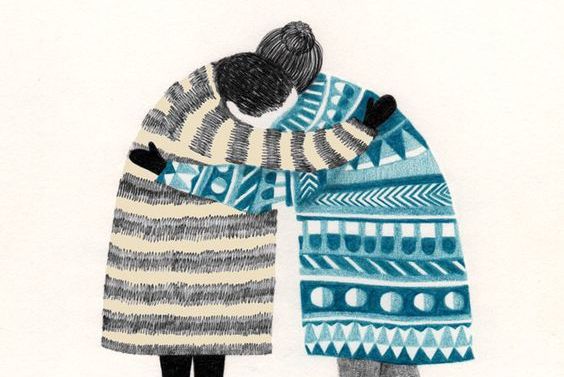Courtesy Costs Nothing and Achieves a Lot

Being courteous costs nothing but achieves a lot. It is a behavior that should be seen more often, because words spoken with softness, tact and courtesy are constructive, because an “I’m sorry”, a “please” or a “you first” are the perfume of kindness that many of us insist of continuing to practice.
That said, beyond seeing courtesy as a simple act of respect towards our fellow humans, we could say that it is something more than that. We are talking about a personal value, about a way of behaving where we create positive relationships through cordiality. Where recognition helps us to build a significant and perhaps even powerful kind of language.
“Courtesy shows tenderness without wimpiness, with humor and a way of knowing how to behave in any context”
-Fernando Savater-
If we stop for a moment to analyze these kinds of behaviors we will realize that, often, we experience a courteous act as something surprising. Why is this person being so kind to me? Are they flirting with me? Do they want something from me? We’ve reached a point where courtesy effectively takes us by surprise and even causes us mistrust.
This is a curious point that is worth reflecting on.

Courtesy costs nothing and is taught by example
We live in a society where when we ask for help or information from certain companies or organizations over the phone, we are answered by programmed machines. In our buses and trains, signs remind us that we should give up our seat to pregnant women or elderly people, because it would seem that we often “forget” to do so.
But people who act with courtesy don’t need anyone to remind them how to practice kindness. They do it because it feels natural and also because they’ve lived this way since childhood. In fact, and even if it seems strange, it is not enough to teach our children to be kind, to say thank you, to say good morning or to express an “I’m sorry” when the situation requires it.
Children learn better by example than through words, so we should be very careful with what we do or say in front of them, given how attentive, receptive and incredibly sensitive they are.
- It is no use to tell our children to say please when they ask for things if they see how their father imposes his will, desires and orders without taking into account their mother or the children themselves.
- It is no use to tell our children that they should respect others if they hear their mother, father or grandparents putting others down behind their backs.
- It is of little use to tell any child that it is important to treat others as they would like to be treated, if what they receive from their family is a lack of understanding, loneliness or unhappiness.

No-one can develop or apply authentic courtesy if they haven’t first experienced, felt and seen in their own skin how authentic acts of kindness and recognition of others are created. When we experience what it feels like to be taken into account by others, we can understand why it is so important to promote this same sensation in others.
Because courtesy costs nothing but achieves a lot.
Be kind and you will begin a powerful “epidemic”
Kindness, as well as the lack of courtesy, can be equally powerful as triggers of authentic epidemics in many of our day-to-day scenarios. To demonstrate this, it is enough to remember a study carried out in 2011 about psychology in a business context. The study analyzed the impact of the lack of courtesy in this environment which is so familiar to many of us.
- The majority of the people surveyed declared that they experience acts of lack of kindness of even rudeness once a week in their work dynamics.
- 47% of the people surveyed revealed that their work performance was not optimal due to the multiple situations of lack of courtesy and consideration: they didn’t feel recognized or supported.
- 12% left their jobs due to these behaviors.
- 25% explained that the lack of courtesy created a certain toxicity in them, so much so that they it rubbed off on them and they found themselves transmitting this same negativity and lack of consideration to their own clients or other work colleagues.
The lack of kindness or courtesy creates environments of great negativity that interfere with human well-being and also with productivity. It is a germ with serious side-effects.

How to make kindness contagious
The neuro-economist Paul Zak. J explains that to improve our work and personal environments it is necessary to act with courtesy, kindness and recognition. Our brain reacts positively to unexpected acts of kindness. It secretes oxytocin which, beyond just being the hormone related to maternity and affection, is also defined as “the moral hormone”.
- To achieve kinder environments, it’s not enough to just be courteous. If day after day we inhabit a context filled with acts that lack courtesy, it is necessary to make how we are feeling visible, to show that these behaviors have a negative impact.
- Rudeness, lack of tact and lack of respect should not be allowed to happen. We need to put limits, vetos and warnings.
- Experts in work psychology talk about establishing a psychological pact. Something along the lines of: “if you show me consideration and respect, you will get the best from me and I will get the best from you. We will both win. However, if you put me down, this circle of harmony breaks and we all lose.”
Kindness and courtesy are not just simple lessons to transmit to our children: it is much more than that. It is a way of life through which we can set an example to create a much more dignified world for everyone.
Being courteous costs nothing but achieves a lot. It is a behavior that should be seen more often, because words spoken with softness, tact and courtesy are constructive, because an “I’m sorry”, a “please” or a “you first” are the perfume of kindness that many of us insist of continuing to practice.
That said, beyond seeing courtesy as a simple act of respect towards our fellow humans, we could say that it is something more than that. We are talking about a personal value, about a way of behaving where we create positive relationships through cordiality. Where recognition helps us to build a significant and perhaps even powerful kind of language.
“Courtesy shows tenderness without wimpiness, with humor and a way of knowing how to behave in any context”
-Fernando Savater-
If we stop for a moment to analyze these kinds of behaviors we will realize that, often, we experience a courteous act as something surprising. Why is this person being so kind to me? Are they flirting with me? Do they want something from me? We’ve reached a point where courtesy effectively takes us by surprise and even causes us mistrust.
This is a curious point that is worth reflecting on.

Courtesy costs nothing and is taught by example
We live in a society where when we ask for help or information from certain companies or organizations over the phone, we are answered by programmed machines. In our buses and trains, signs remind us that we should give up our seat to pregnant women or elderly people, because it would seem that we often “forget” to do so.
But people who act with courtesy don’t need anyone to remind them how to practice kindness. They do it because it feels natural and also because they’ve lived this way since childhood. In fact, and even if it seems strange, it is not enough to teach our children to be kind, to say thank you, to say good morning or to express an “I’m sorry” when the situation requires it.
Children learn better by example than through words, so we should be very careful with what we do or say in front of them, given how attentive, receptive and incredibly sensitive they are.
- It is no use to tell our children to say please when they ask for things if they see how their father imposes his will, desires and orders without taking into account their mother or the children themselves.
- It is no use to tell our children that they should respect others if they hear their mother, father or grandparents putting others down behind their backs.
- It is of little use to tell any child that it is important to treat others as they would like to be treated, if what they receive from their family is a lack of understanding, loneliness or unhappiness.

No-one can develop or apply authentic courtesy if they haven’t first experienced, felt and seen in their own skin how authentic acts of kindness and recognition of others are created. When we experience what it feels like to be taken into account by others, we can understand why it is so important to promote this same sensation in others.
Because courtesy costs nothing but achieves a lot.
Be kind and you will begin a powerful “epidemic”
Kindness, as well as the lack of courtesy, can be equally powerful as triggers of authentic epidemics in many of our day-to-day scenarios. To demonstrate this, it is enough to remember a study carried out in 2011 about psychology in a business context. The study analyzed the impact of the lack of courtesy in this environment which is so familiar to many of us.
- The majority of the people surveyed declared that they experience acts of lack of kindness of even rudeness once a week in their work dynamics.
- 47% of the people surveyed revealed that their work performance was not optimal due to the multiple situations of lack of courtesy and consideration: they didn’t feel recognized or supported.
- 12% left their jobs due to these behaviors.
- 25% explained that the lack of courtesy created a certain toxicity in them, so much so that they it rubbed off on them and they found themselves transmitting this same negativity and lack of consideration to their own clients or other work colleagues.
The lack of kindness or courtesy creates environments of great negativity that interfere with human well-being and also with productivity. It is a germ with serious side-effects.

How to make kindness contagious
The neuro-economist Paul Zak. J explains that to improve our work and personal environments it is necessary to act with courtesy, kindness and recognition. Our brain reacts positively to unexpected acts of kindness. It secretes oxytocin which, beyond just being the hormone related to maternity and affection, is also defined as “the moral hormone”.
- To achieve kinder environments, it’s not enough to just be courteous. If day after day we inhabit a context filled with acts that lack courtesy, it is necessary to make how we are feeling visible, to show that these behaviors have a negative impact.
- Rudeness, lack of tact and lack of respect should not be allowed to happen. We need to put limits, vetos and warnings.
- Experts in work psychology talk about establishing a psychological pact. Something along the lines of: “if you show me consideration and respect, you will get the best from me and I will get the best from you. We will both win. However, if you put me down, this circle of harmony breaks and we all lose.”
Kindness and courtesy are not just simple lessons to transmit to our children: it is much more than that. It is a way of life through which we can set an example to create a much more dignified world for everyone.
This text is provided for informational purposes only and does not replace consultation with a professional. If in doubt, consult your specialist.







